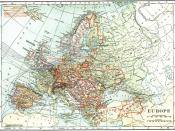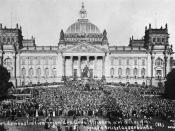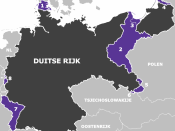World War I brought about unprecedented suffering in European history. The goal following World War I was to restore European stability and maintain everlasting peace. The Versailles Treaty did little to shape any sort of long-term peace from the results of World War I. The Treaty of Versailles was put together at the Paris Peace Conference in January 1919. The Paris Peace Conference began on January 18, 1919, with 21 nations in attendance. The representatives of Germany and the other defeated Central Powers were not allowed to sit at the conference table. The "Big Four" - President Wilson of the United States, Prime Minister Lloyd George of Great Britain, Prime Minister Georges Clemenceau of France and Prime Minister Vittorio Orlando of Italy - dominated the conference and made the important decisions. The Treaty of Versailles reflected outdated, nineteenth century conceptions of the criteria of power and how to prevent war.
. In addition, the balance of power required a policeman to monitor the smaller states and smaller conflicts. The Treaty of Versailles should have made the victors to either conciliate the enemy or destroy them. The Treaty of Versailles did neither. It did not pacify Germany, still less permanently weaken her, appearances notwithstanding, but left here scourged, humiliated and resentful. In that sense, it was not a "peace treaty" but a truce in a European thirty-year civil war.
The Treaty of Versailles disarmed Germany, demilitarized the Rhineland (the German territory west of the River Rhine), and shrank German and Austro- Hungarian territory to make room for a series of new states aimed at buffering Germany to the east. It imposed blame for the war on Germany in the famous War Guilt Clause and, by extension, forced it to pay over thirty billion dollars in reparations to the Allies. All
German colonies were to be handed over to the League of Nations, the German navy was to be ripped apart, and German industrial resources were to be transferred to France and Britain. The clauses were harsh, but the British and French were not interested in mere apologies from Berlin, they wanted to punish the Hun and guarantee their own security. As for Austria-Hungary, the empire was dissolved and the new states of Czechoslovakia and Yugoslavia, combined with landlocked and separate Austria and Hungary, emerged. Romania also received some Austrian lands.
The Treaty of Versailles was a complex document that had many consequences for the people of Germany and the World. The loss of vital industrial territory severed a huge blow to any attempts by Germany to rebuild her economy. Coal from the Saar and Upper Silesia in particular was a vital economic loss. Before the terms of the Treaty of Versailles being introduced, Germany was already devastated and when the reparation debt was introduced, they could not believe it. Combined with the financial penalties linked to the reparations worth ã6600 million, it seemed clear that the Allies wanted nothing else but to bankrupt Germany. Due to the reparations, there was an increase in German inflation and since the United Sated refused to provide financial aid to the German government, it wasn't a pretty sight.
The Treaty triggered a number of political reactions. Firstly, the government of the day resigned, having refused to sign it. The very fact that the treaty was signed can be seen as undermining the Weimar Republic. Almost immediately there were claims that the troops had been, 'stabbed in the back' by the Government. This Theory grew in popularity as the economy suffered and many believed that the politicians had lost the war rather than the army. This, amongst other things, led to a growth in the number of people who distrusted the Weimar Republic and were unwilling to support it. The Treaty also called for the trial of the former Kaiser. This never happened as the Dutch government refused to hand him over, but this effectively stopped any chance of a restoration of the monarchy in Germany. In Western Europe, the Treaty signaled the beginning of a period of isolation for Germany. She became an outcast in international politics and was feared and distrusted by the Allies. This had a significant impact on the role that Germany would, and potentially could, play in European and World affairs in the early post war climate.
A second political effect centers solely on the treatment of Germany in the Treaty of Versailles of 1919. The Germans were forced to sign a humiliating treaty accepting responsibility for causing the war, as well as dole out large sums of money in order to compensate for war costs. In addition, the size of the German state was reduced, while that of Italy and France was enlarged. The Weimar government set up in Germany in 1918 was ill liked by most of the citizens and maintained little power in controlling the German state. Rising hostilities toward the rest of Europe grew, and many German soldiers refused to give up fighting, even though Germany's military was ordered to be drastically reduced. Given such orders, numerous German ex-soldiers joined the Freikorps, an establishment of mercenaries available for street-fighting. The open hostility and simmering feelings of revenge exhibited by Germany foreshadowed the start of World War II.
The Treaty of Versailles was one of the most important causes that led to Hitler's rise in Germany. From the German point of view, the treaty was incredibly harsh and devastating for Germany. Hitler had very strong views on the treaty. Even though he was Austrian, he loved Germany more than anything. Hitler hated the Treaty of Versailles and he often referred to the people who signed it as "November criminals" because the war had ended in November. He stirred up the German people by reminding them of parts of the treaty that they would not like and he promised that if he was elected he would refuse to abide by many terms in the treaty, such as the reparations, military restrictions, and the land which was "stolen" away from Germany. He knew that people in Germany felt bad from the depression, and so the majority of the population blamed their problems on the treaty, this caused many to turn towards Hitler, because he had been against the treaty right from the start. The Treaty of Versailles was like a big stick of dynamite, and Hitler was just a little boy with the match. Once elected Chancellor in 1933, there was no way to stop him from leading the World in a collision course that ultimately led to the Second World War.
The Treaty of Versailles changed the geography of Europe and the rest of the world. It broke up Austria Hungary, the German territories and her colonies and prevented economic cooperation in the newly formed states. The Versailles Treaty redoubled the pace of Balkan intrigue. The Treaty of Versailles set up countries such as Poland and Czechoslovakia to keep an eye on Germany and it converted the Rhineland into a demilitarized zone. These were sensible things to do to avoid another war, which was the main aim of The Treaty of Versailles. Hence, the balance of power in Europe was disturbed.
The contents of The Treaty of Versailles were harsh and solely designed to disable the nation of Germany. The Treaty of Versailles was the only real option given to Germany after they surrendered steps away from Paris on November 11, 1918. The defeated nations of World War I should have been given a chance to re-establish themselves socially, politically, and economically before handing over their money and natural resources. If a proper and rational offer of peace had been presented to Germany, it may have changed the course of world history. The Peace Treaty of Versailles created by the Allies signified the results of hostility and revenge. All of the precautions taken were to ensure the defeat of the German military and to prevent Germany from ever challenging the Allies again. Germany had come to Versailles with the expectations of receiving an offer of peace, a document to end the inhumane and vicious attacks that had encompassed the world since the beginning of the war in 1914. Instead, Germany was offered a document that demanded territory, weapons and military, and reparations that filled Germany with anger and questions and a break down of nationalism throughout the country.
There is a large and important section that is completely ignored by the critics - that which reconstructs Central Europe based on nationality and the free choice of the people instead of being based on strategy and military convenience. This is the section that liberated Poland from the claws of the three carnivorous empires that were preying on its vitals, and restored to life, liberty and independence. The new socialist government of Weimar (SPD), whose constitution was adopted on July 30, 1919, entered a situation they by no means created. After the Weimer Government took over, Germany's constitution was the most democratic in the world and the German people were given more rights than ever before.
In the first section of the Treaty of Versailles was the covenant of the League of Nations. The League of Nation's task was simple - to ensure that war never broke out again. After the turmoil caused by the Versailles Treaty, many looked to the League to bring stability to the world. In view of the League's desire to end war, the only criteria that can be used to classify a success, was whether war was avoided and a peaceful settlement formulated after a crisis between two nations. The League quickly proved its value by settling the Swedish-Finnish dispute over the Aland Islands, guaranteeing the security of Albania , rescuing Austria from economic disaster, settling the division of Upper Silesia, and preventing the outbreak of war in the Balkans between Greece and Bulgaria . Therefore, the League of Nations prevented another war from breaking out though one could say that it was merely postponed.
The Versailles Peace Treaty was designed to perpetuate the repartition of the capitalist world in favour of the victor countries, and to establish a system of relationships between countries aimed at strangling Soviet Russia and suppressing the revolutionary movement throughout the world. The Treaty of Versailles was flawed to the extent that instead of preventing future wars it made a future war inevitable. This time the destruction would be complete. Germany would lose its sovereignty for almost half a century, split between democracy and communism. European decline was completed, and two new powers dominated the world: the United States and the Soviet Union. The Treaty of Versailles brought what many had begun to expect it would: war. The provisions of the victorious peacemakers failed to fill the vacuum - millions had died in vain.


